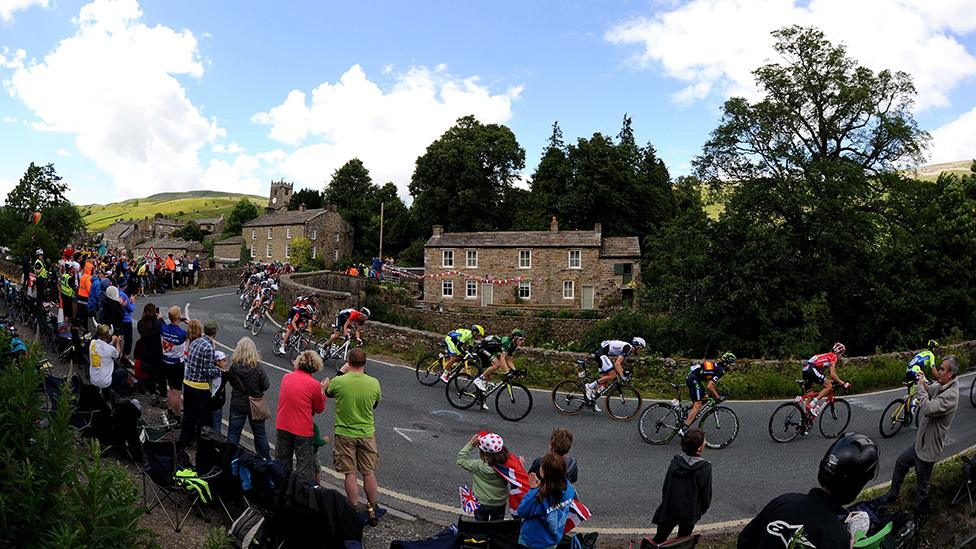'So many people had smiles on their faces'
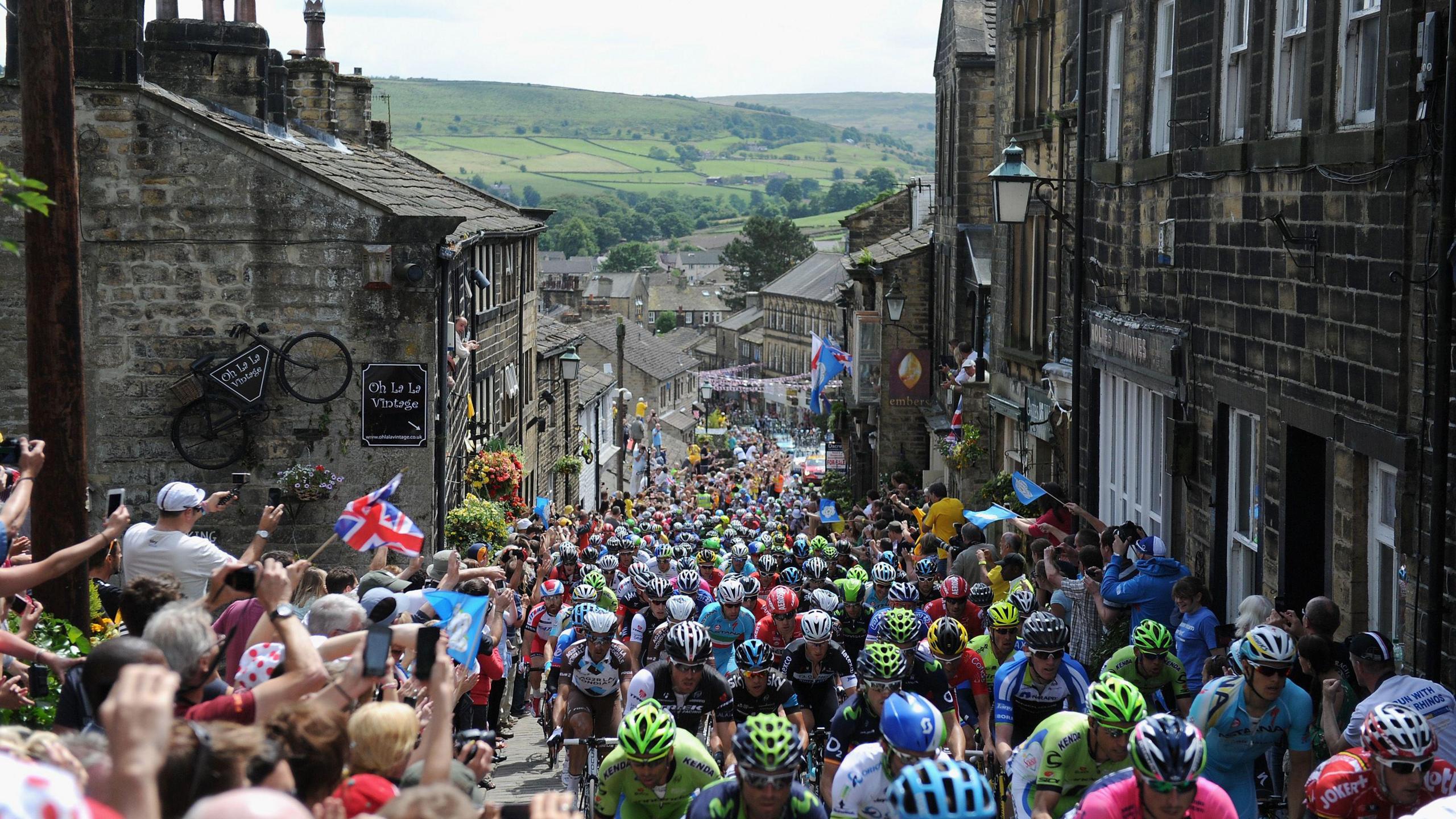
Haworth, home to steep cobbled streets and Brontë heritage, offered one of the definitive sights of the Tour de France weekend
- Published
"Unforgettable", "unbelievable" and a "milestone" - just some of the words that have been used to describe a few days in 2014 when history was made in Yorkshire.
It was the weekend when people came out in their droves as the opening stages of the Tour de France came to the county for the very first time.
Exactly a decade on from what was described as the "grandest Grand Départ of all time", the BBC's David Spereall looks back on the event, its impact and its legacy for Yorkshire and the people who helped make it happen.
'It was unbelievable'
"I'm sorry for my thick French accent, but 'ee bah gum," says Christian Prudhomme with a smile.
He is looking back on what happened in Yorkshire almost exactly a decade ago - and it would be fair to say that the county's hospitality left a lasting impact on Mr Prudhomme, who has been the director of the Tour de France since 2007.
After a weekend where one of the world's biggest sporting events took in the sights and sites of Skipton and Swaledale, Haworth and Holmfirth, Wharfedale and Wensleydale, he was not alone.
Even Yorkshire's weather behaved itself - just about.
"So many people had smiles on their faces," Mr Prudhomme recalls, 10 years on.
"We were happy. Not only happy, we were proud of seeing so many people," he says.
"Crowds everywhere. It was unbelievable."
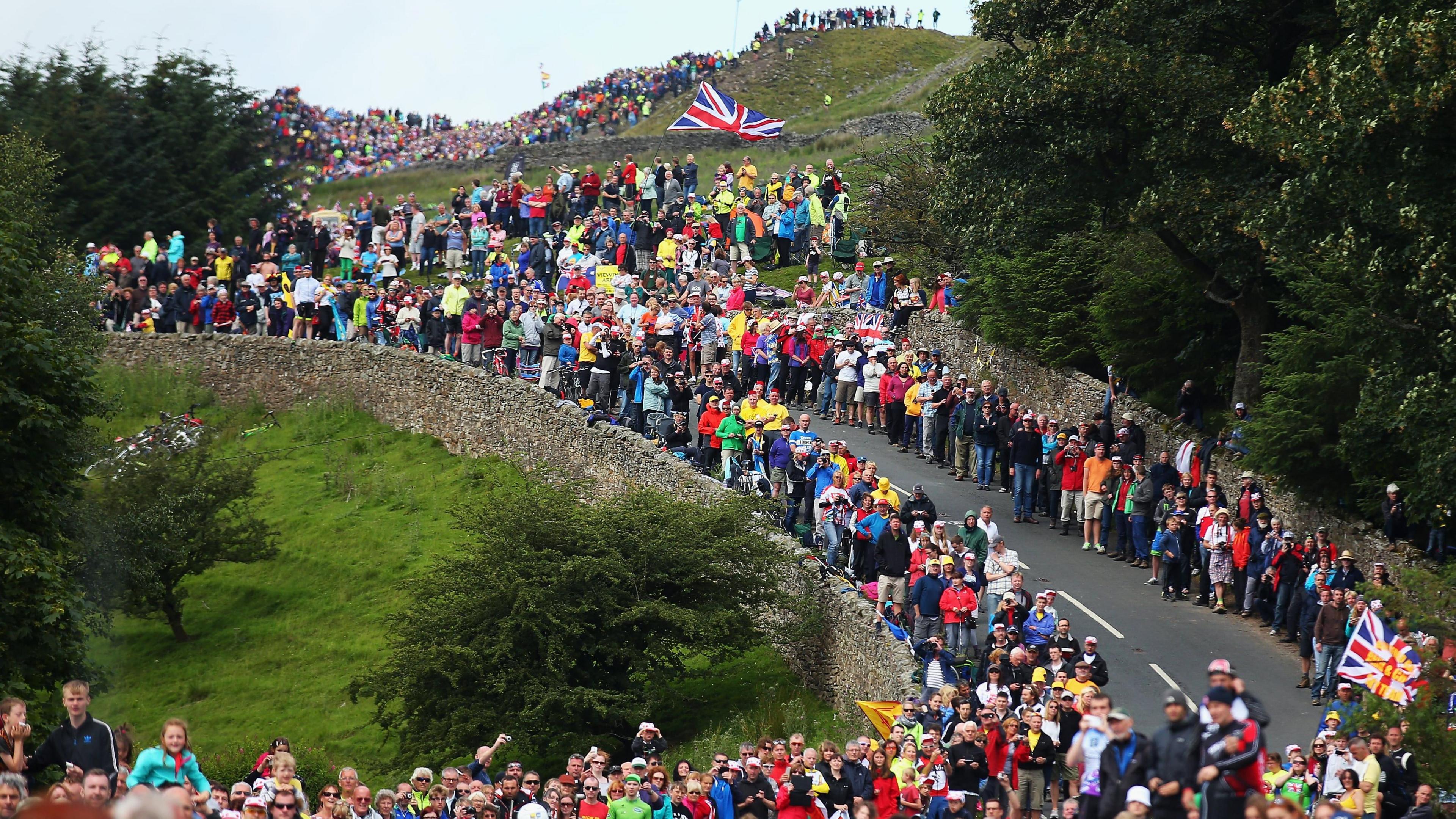
Hordes of spectators lined the route in Harrogate for the end of Stage One of the race
It was back in 2012 that it was announced Yorkshire would host the start of the 2014 Tour de France, or the Grand Départ as its official Gallic title goes.
Stage One, held on 5 July 2014, took the planet's premier cyclists on a route from Leeds to Harrogate.
Stage Two, the following day, took them from York to Sheffield.
Despite a huge charm offensive from the tourism body Welcome to Yorkshire, aimed at generating hype and interest ahead of the event, organisers later admitted the level of support and interest from people in the region surpassed even their lofty expectations.
For instance, staff at every pub in the north Leeds suburb of Otley translated the name of their hostelries into French, while craft groups knitted miles of bike-themed bunting and crowds totalling 2.5 million thronged along the whole route.
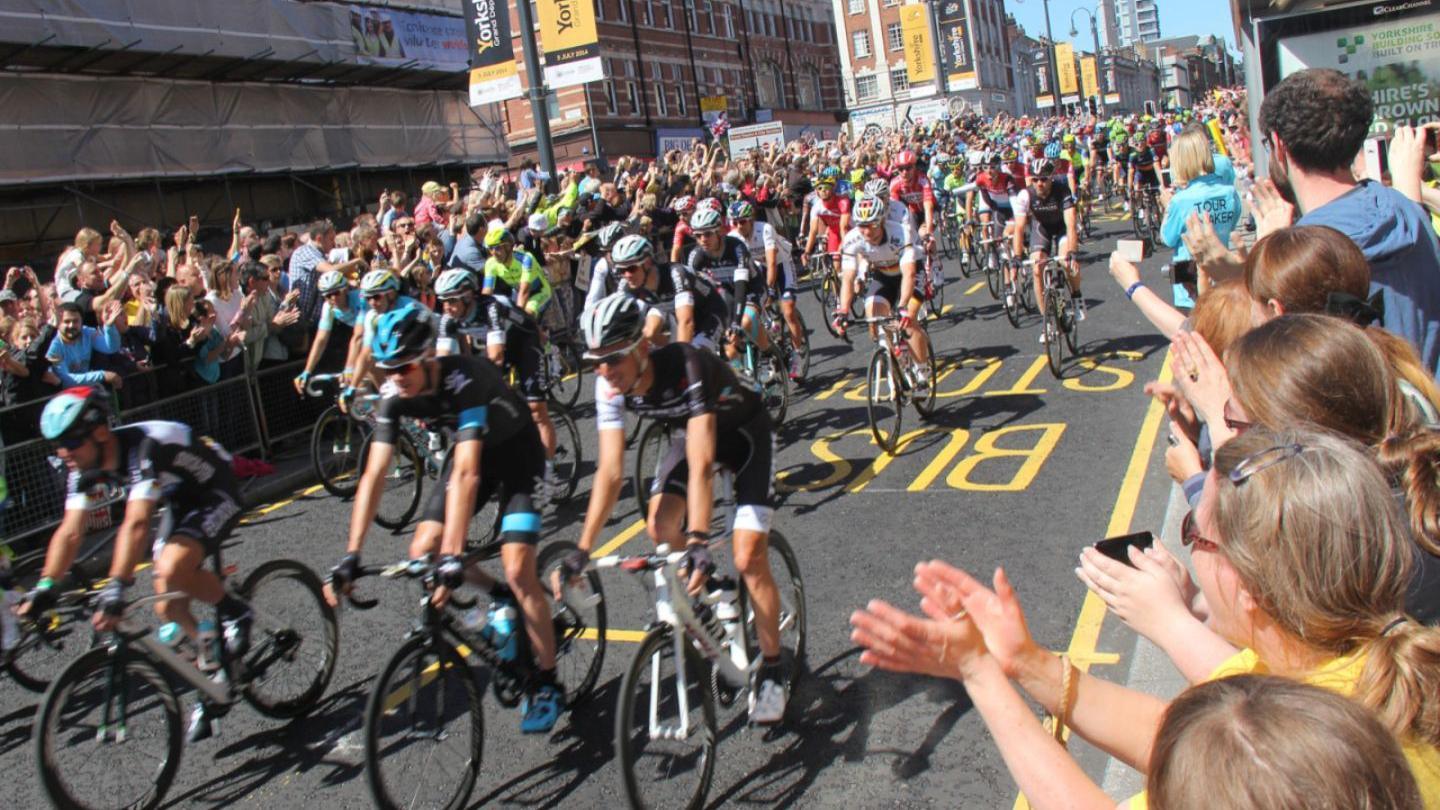
Friday 5 July 2024 marks the 10th anniversary of the Grand Départ coming to Yorkshire
Pete Sparks, owner of the Bank View Café in Langsett, South Yorkshire, remembers the atmosphere on the day the race passed his venue as being like "just a massive carnival".
The café provided one of the most memorable spectacles of the Tour after Mr Sparks, in a moment of inspiration, had painted it in Tour de France-themed polka dots just weeks before.
Welcome to Yorkshire roadshows had advised businesses of the advantages of standing out in the views from broadcasters' helicopters, with aerial views more crucial to the Tour than perhaps any other sporting event in the world.
"I originally painted the café in sparkling white because I thought it’s got to look good," Mr Sparks recalls.
"I stepped back and admired my finished work and I just had this moment of understanding about what I needed to do next."
After finishing his work, which he had kept a closely guarded secret from even his own staff, Mr Sparks posted a picture of it on the café's Facebook page, thinking it would garner little excitement beyond its own customers.
Instead, various branches of the world's media descended on the place as it became the perfect pictorial backdrop to coverage of the Tour.
"It has had a long-lasting effect on the café," Mr Sparks says.
"It’s made us visible and picture-worthy in a picture-orientated world. It shows you’ve just got to grab the moment."
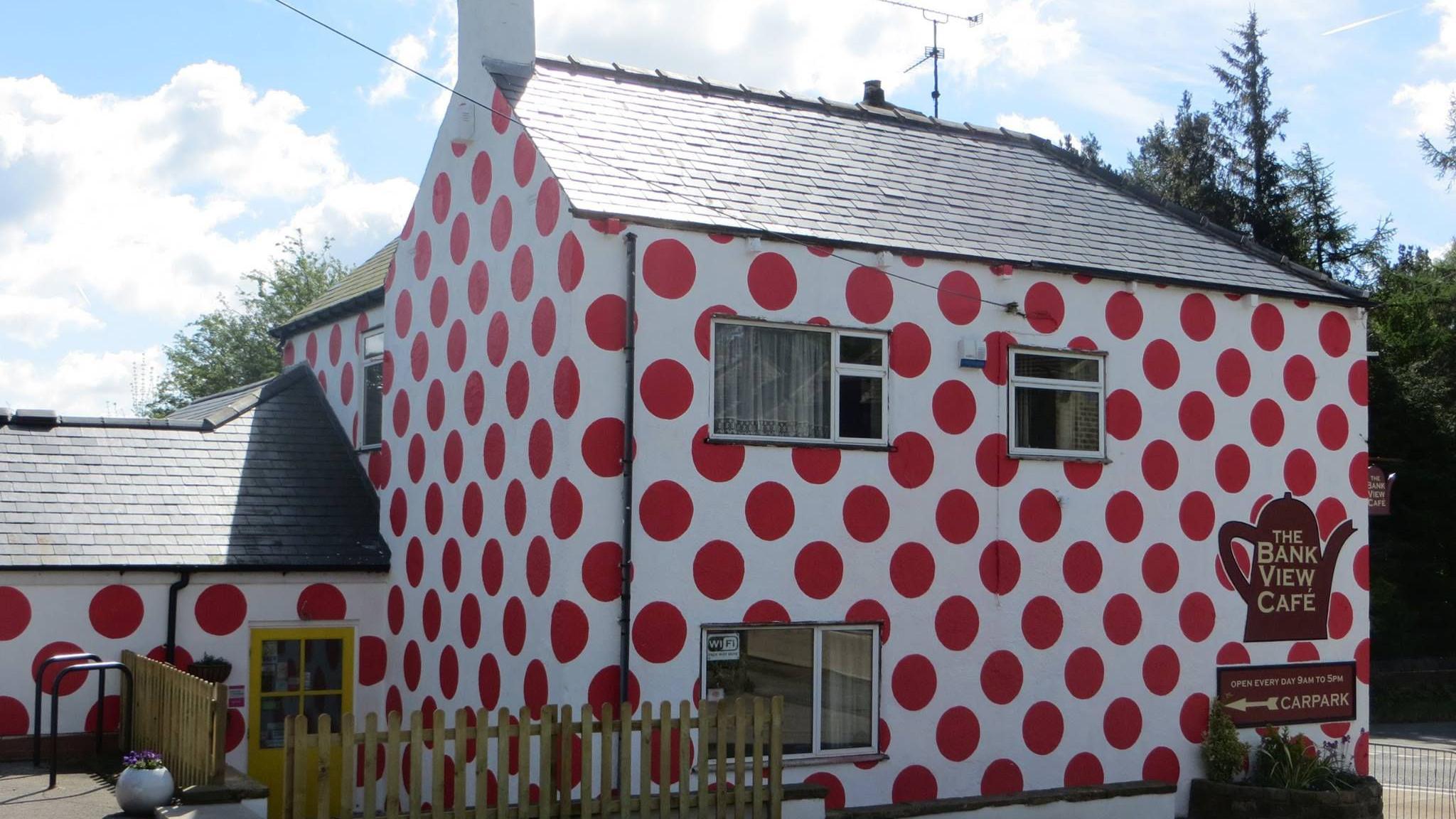
Pete Sparks admits he was taken by surprise by the attention his polka-dot café received during the weekend
Grabbing the moment is certainly what Welcome to Yorkshire did in those heady days of 2014.
The now defunct tourism body was front and centre of the organisation and public relations around the Tour.
As chief executive, it was Gary Verity who earned the public plaudits, and later a knighthood, for pulling off the coup of convincing the Tour to hold its opening stages in Yorkshire in the first place.
At one point on Stage One, as his delegation car moved along the route, he cut an almost papal figure, standing up and acknowledging the crowds.
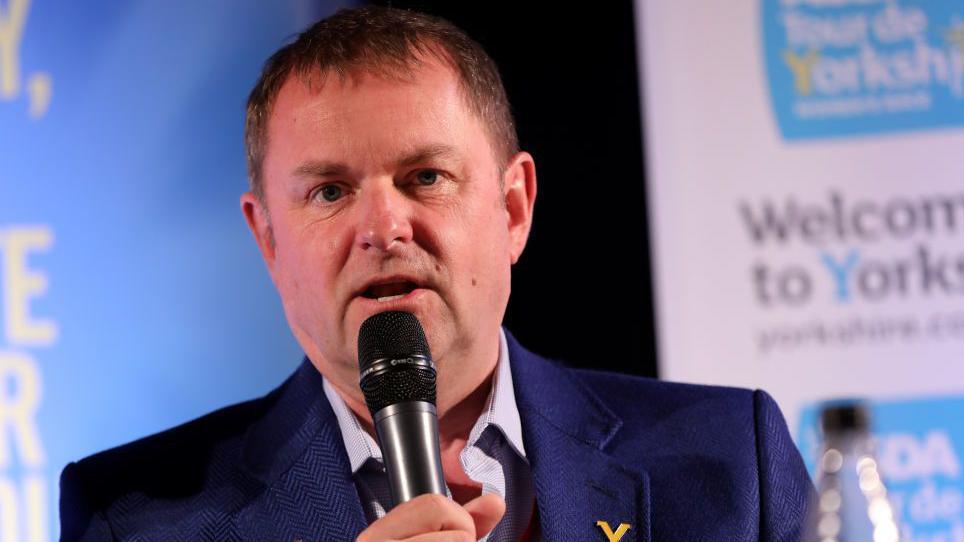
Sir Gary Verity, boss of Welcome to Yorkshire, earned plaudits for bringing the Tour de France to Yorkshire
Sir Gary resigned from Welcome to Yorkshire in March 2019 after an investigation found he had "made errors of judgement regarding his expenses".
The organisation said Sir Gary had left on "health grounds", adding that his resignation was not directly linked to concerns raised "in relation to his behaviour towards staff and his expenses".
West Yorkshire Police said in June 2020 its investigation into Sir Gary's expense claims was complete and "no further action" would be taken.
Welcome to Yorkshire later went into administration after council leaders agreed to cut off its funding.
Sir Gary, who did not respond to requests for an interview for this piece, has always denied allegations of wrongdoing.
In the eyes of some, the episode took a coat of gloss off the legacy of Welcome to Yorkshire in 2014.
But Mr Prudhomme says he enjoyed working with Sir Gary, adding that the Grand Départ was "so strong, thanks to him and to his team".
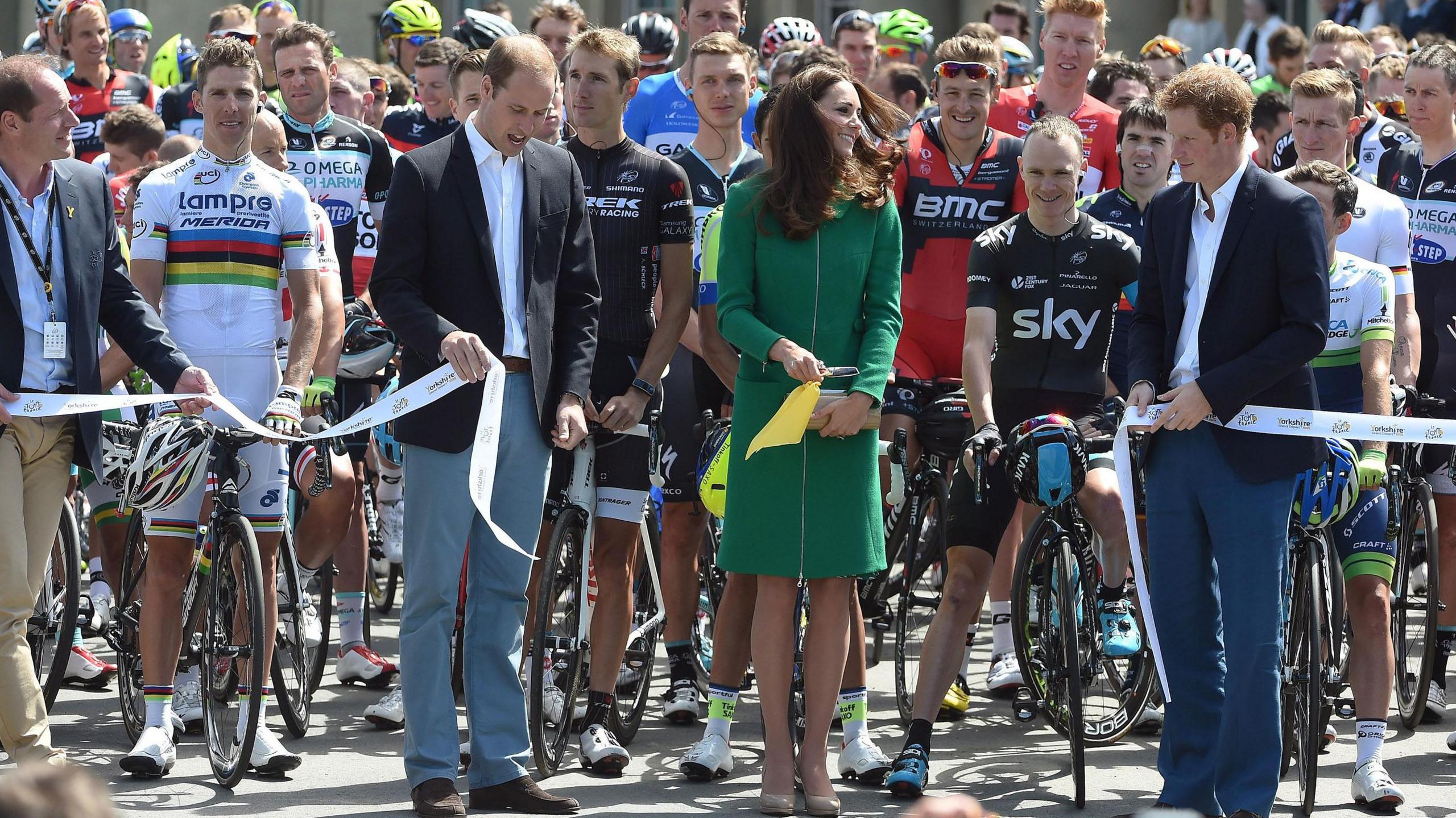
Members of the Royal Family travelled to Yorkshire to get the Grand Départ under way in July 2014
Cycling fan Keith Wakefield, the then leader of Leeds City Council, was one of those who had to work closely with Welcome to Yorkshire.
He insists that the later problems do not tarnish the memory of what happened in the summer of 2014.
Mr Wakefield, who owns a scrapbook commemorating the weekend, says while Welcome to Yorkshire was at the "heart" of the occasion, "I think people just remember it as a great day for Yorkshire".
"Yes, their logos were there, but I never heard people say, ‘we shouldn’t have done that’ because of what happened to Welcome to Yorkshire," he says.
"People just say, 'what a great day that was'."
Mr Wakefield, whose council had played a crucial role in bringing together the preparations for the Grand Départ, admits being wracked with nerves the night before, in part because the weather "wasn't being kind".
"You were just hoping there were no accidents or disasters," he says.
"If you sleep well, you’re very lucky because you wake up and you think, what if it carries on raining? What if someone falls off in the first couple of miles?
"But we got through. I think it surpassed everyone’s expectations. The weather got better as the day unfolded. People had a great time with barbecues."
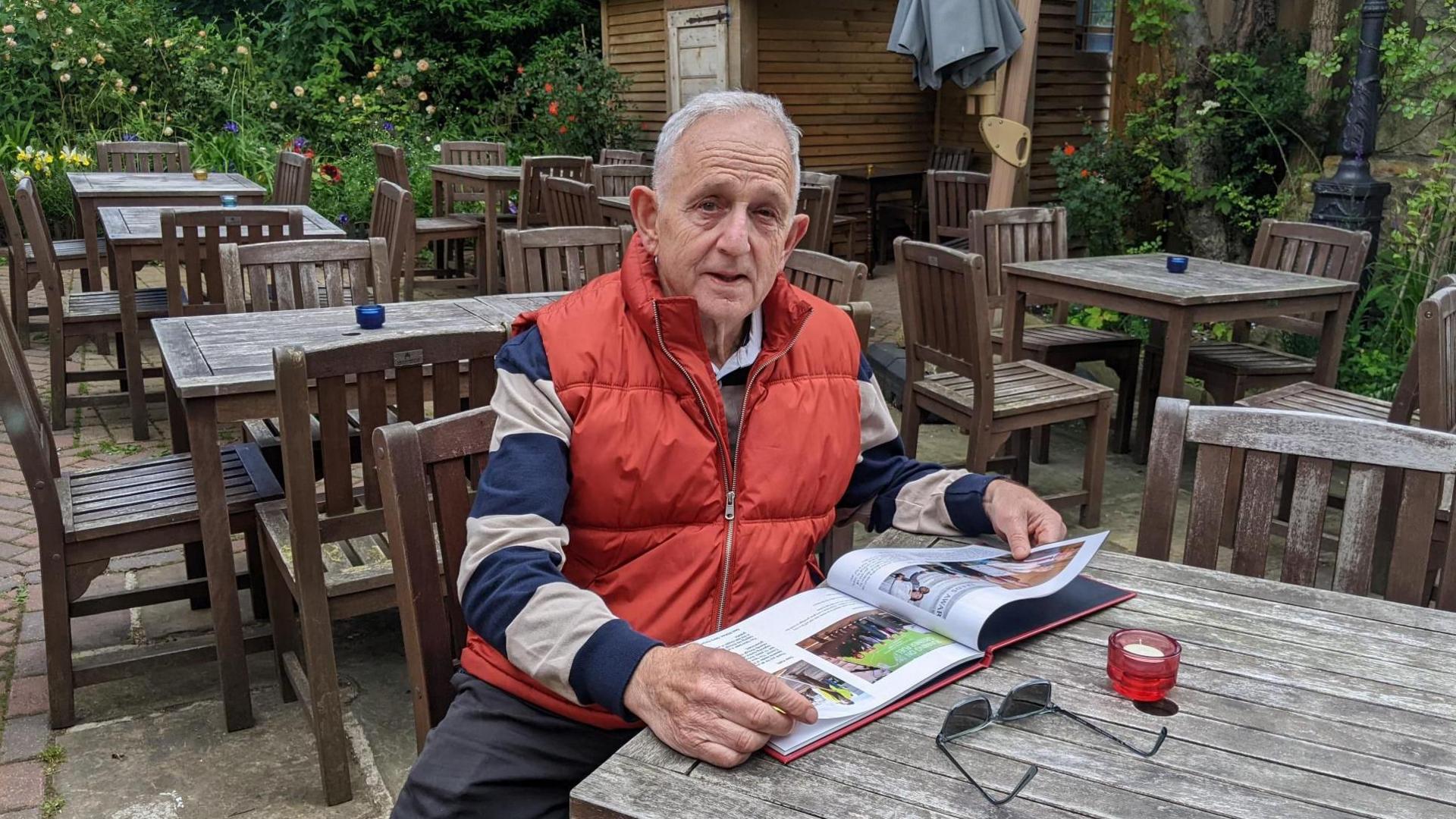
Former Leeds Council leader Keith Wakefield keeps a commemorative scrapbook of the occasion
Organisers hoped one part of the legacy of the Tour would be a long-term boost to Yorkshire tourism, as the eyes of people from not only this country but across the world were opened to TV footage of rolling hills, sheep-filled fields and drystone walls.
The figures would suggest they got it. According to data from the Office of National Statistics, tourists stayed in the region for a collective 11.1 million nights in 2019, which was up from 7.3 million in 2013.
The event certainly left a lasting legacy for Rachel Moyes, from Bradford.
Ms Moyes was one of the hundreds of volunteers who lined the Tour route to help give directions, answer questions, keep people safe and generally capture a community spirit to the proceedings.
Stationed in Otley, Ms Moyes says the event "changed my life", as she went on to volunteer at a host of other sporting events in the years that followed, meeting her partner, Chris, at one such occasion in 2018.
"It's the best thing I've ever done," she enthuses.
"It was my first ever volunteering event that I’d ever done. I just wanted to push myself out of my comfort zone.
"I was a really shy person beforehand, but I’ve loved meeting people through volunteering and it built my confidence up.
"The whole experience on the day was quite a rush and the crowds were just amazing."
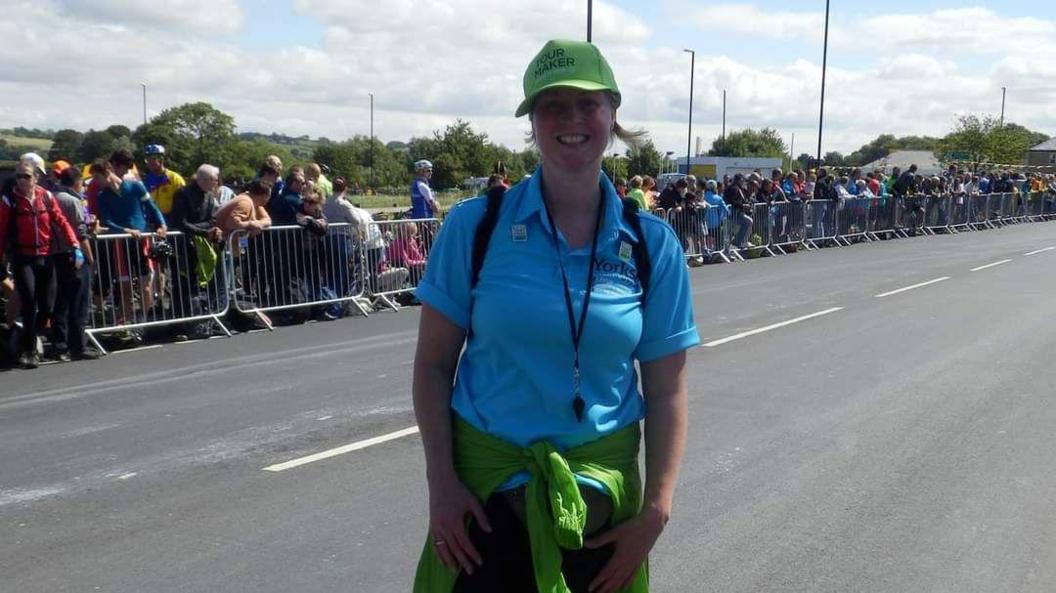
Rachel Moyes describes volunteering at the Tour de France Grand Départ weekend as "the best thing I've ever done"
Peter Barker, from Wakefield, was another first-time volunteer who donned a light blue Grand Départ polo shirt that weekend as he was deployed to Ripon.
Like Ms Moyes, he, too, says the experience brought him out of his shell.
"I’m quite a shy person in reality, but talking to people on the day was all part of the enjoyment," he recalls.
"I don’t cycle myself, but I’d watched the Tour De France for quite a few years on TV. It was great just to mingle with the crowd."
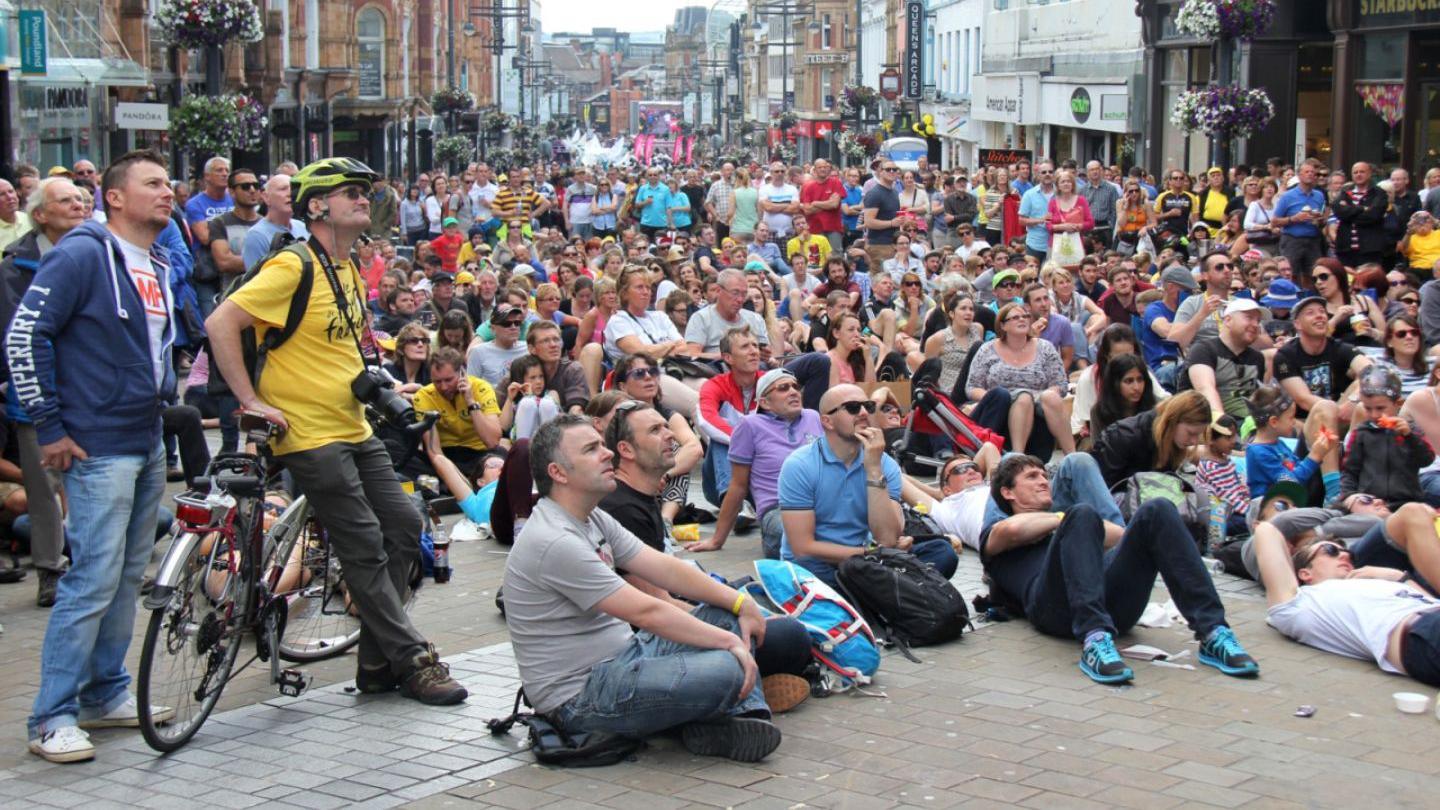
Organisers admitted that the Grand Départ crowd numbers surpassed expectations
So impressed was the cycling fraternity with the local enthusiasm, the region got its own race on the professional circuit, known as the Tour de Yorkshire.
Having caught the volunteering bug, both Ms Moyes and Mr Barker were among those who gladly returned to help as the new race spanned different parts of the county each year between 2015 and 2019.
Crowds remained big and Yorkshire's love affair with cycling seemed to be mutually affectionate.
But with local authorities struggling to meet the costs of hosting the race, and with the crumbling of Welcome to Yorkshire, the event was canned after the Covid pandemic.
"It's really sad that the Tour de Yorkshire is no longer around," Ms Moyes, who volunteered at each edition of the event, says.
"So much effort and passion went into it and that was still there.
"I understand that because of council costs and roads shutting it was difficult, but it would be so good if it came back."
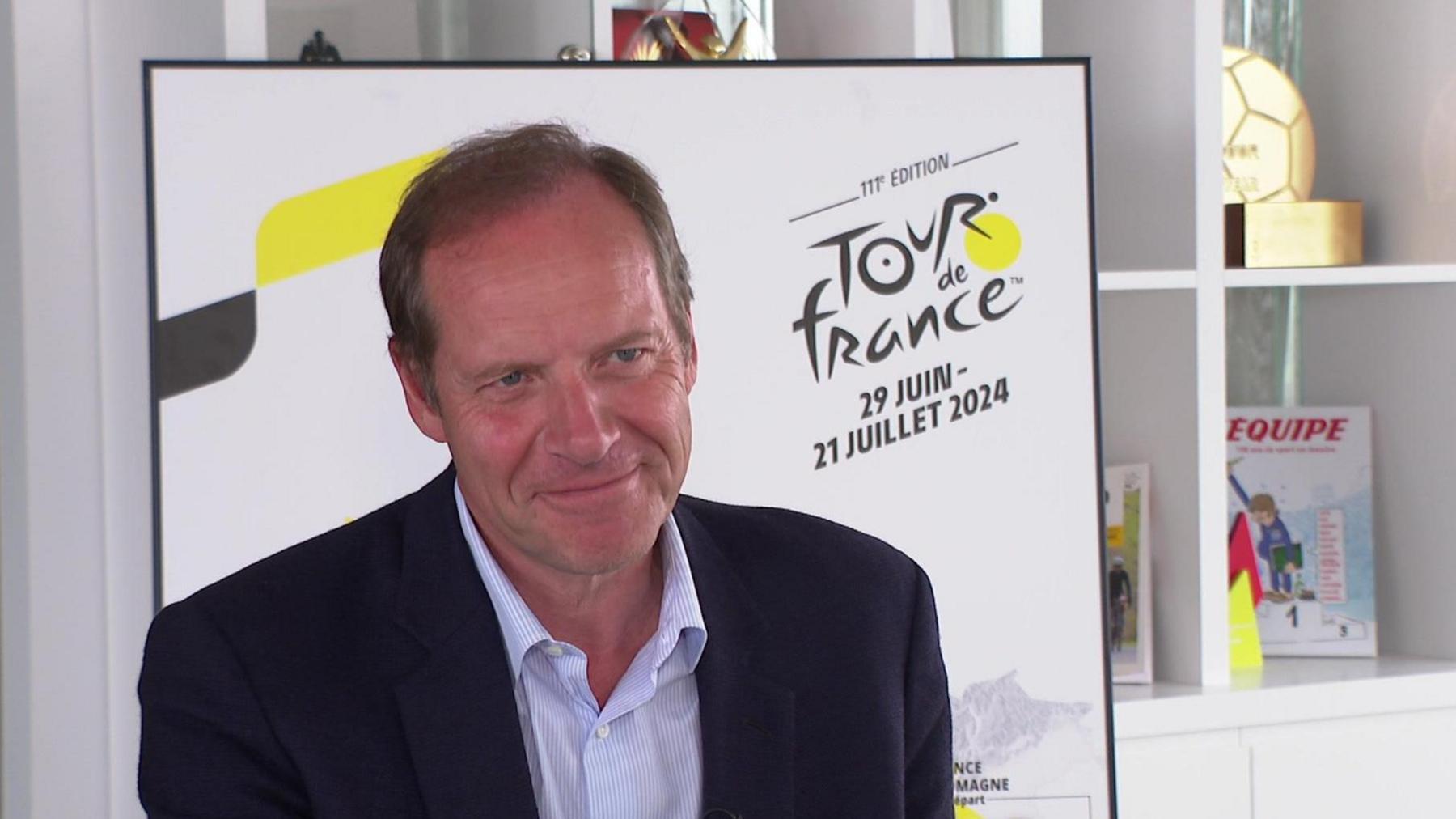
Christian Prudhomme says the Grand Départ in Yorkshire in 2014 was an "unforgettable" experience
Asked by the BBC if 2019 would remain the last Tour de Yorkshire, Mr Prudhomme replied: "I don't know. I hope not. It doesn’t depend on us.
"I’m a Frenchman who loves Yorkshire. I’m not head of the UCI [cycling's world governing body].
"Before the Tour de Yorkshire, I’d never seen a race of that quality with so many people.
"Unfortunately, in terms of economics, it was not possible to continue."
Figures from Sport England suggest participation in cycling for leisure purposes has fluctuated in the 10 years since the Grand Départ.
But enthusiasts living in Yorkshire say they believe hosting the Tour caused a shift in mindset.
Mr Sparks says his Bank View Cafe, an ever-popular haunt for those travelling on two wheels, is frequented by a far wider demographic of people than before 2014.
"Cycling has become more of a normal sport to do. It’s moved away from that middle-aged man image," he says.
"You see lots of female cyclists, younger and older people doing it. It’s a really nice mix of people cycling now."
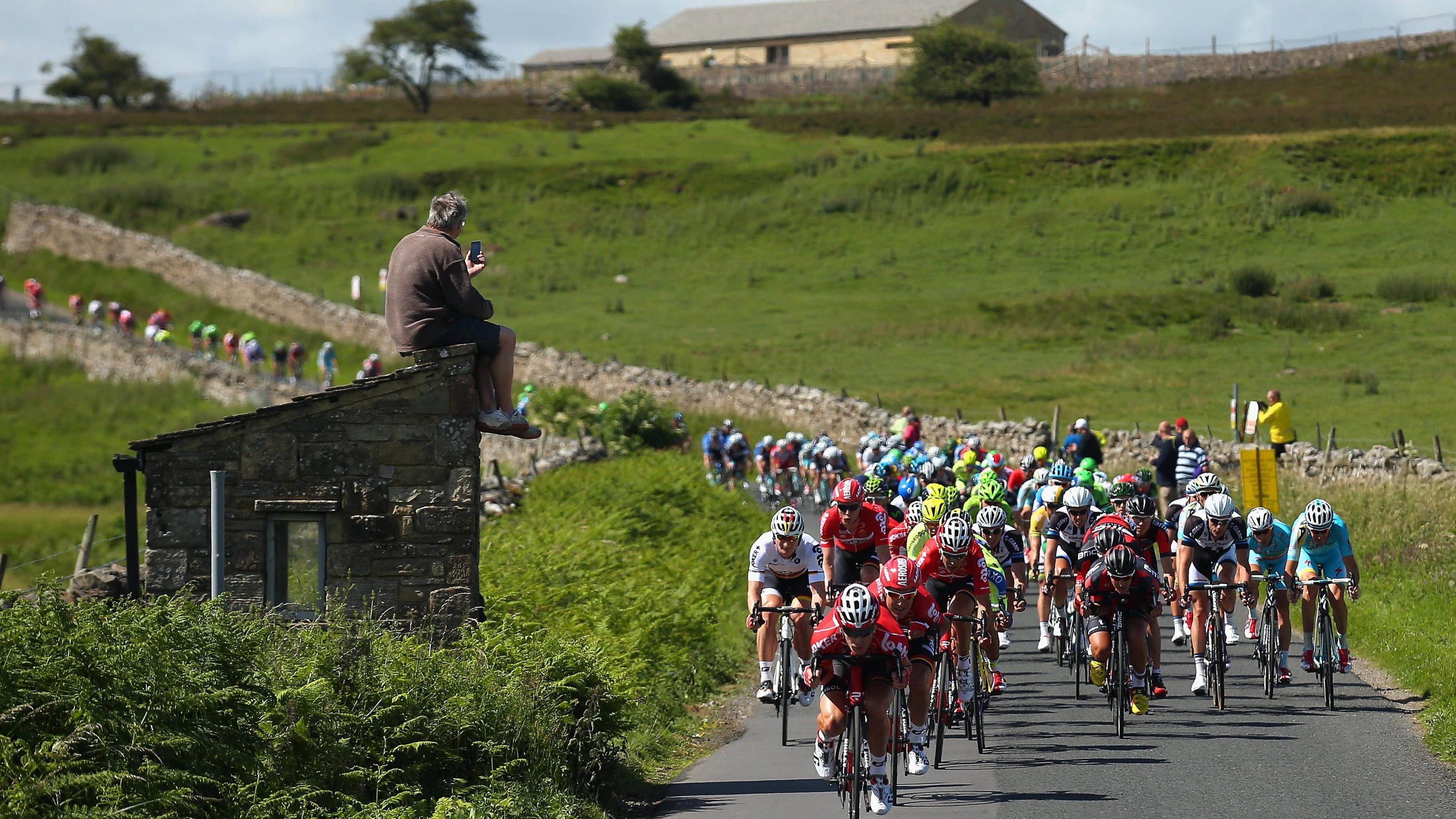
Tourism figures for Yorkshire boomed in the years after the event
Meanwhile, David Miller, from the Leeds Cycling Campaign, says the event helped some authorities reimagine the layout of roads in their areas and changed attitudes to cycling.
Mr Miller says: "Cycling infrastructure in Leeds was pretty dismal. I tended to use backstreets most of the time, staying off the main roads.
"It’s much better now. There’s a much greater amount of cycling infrastructure and people can feel safe."
A mere 111 years after the first ever Tour de France, 2014 marked only the third time the race had started outside of mainland Europe.
Intriguingly, Mr Prudhomme reveals there was originally scepticism among his compatriots about relocating cycling's showpiece event in northern England.
"We had to convince the French people that we were right to have a Grand Départ in Yorkshire," he admits.
"Then they saw on the very first day all these people and it was packed.
"That was very important for us to explain to the French people that we were right, because Yorkshire is 'God's County'.
"It was unforgettable. Gary Verity said at the time that it was 'the grandest Grand Départ'."
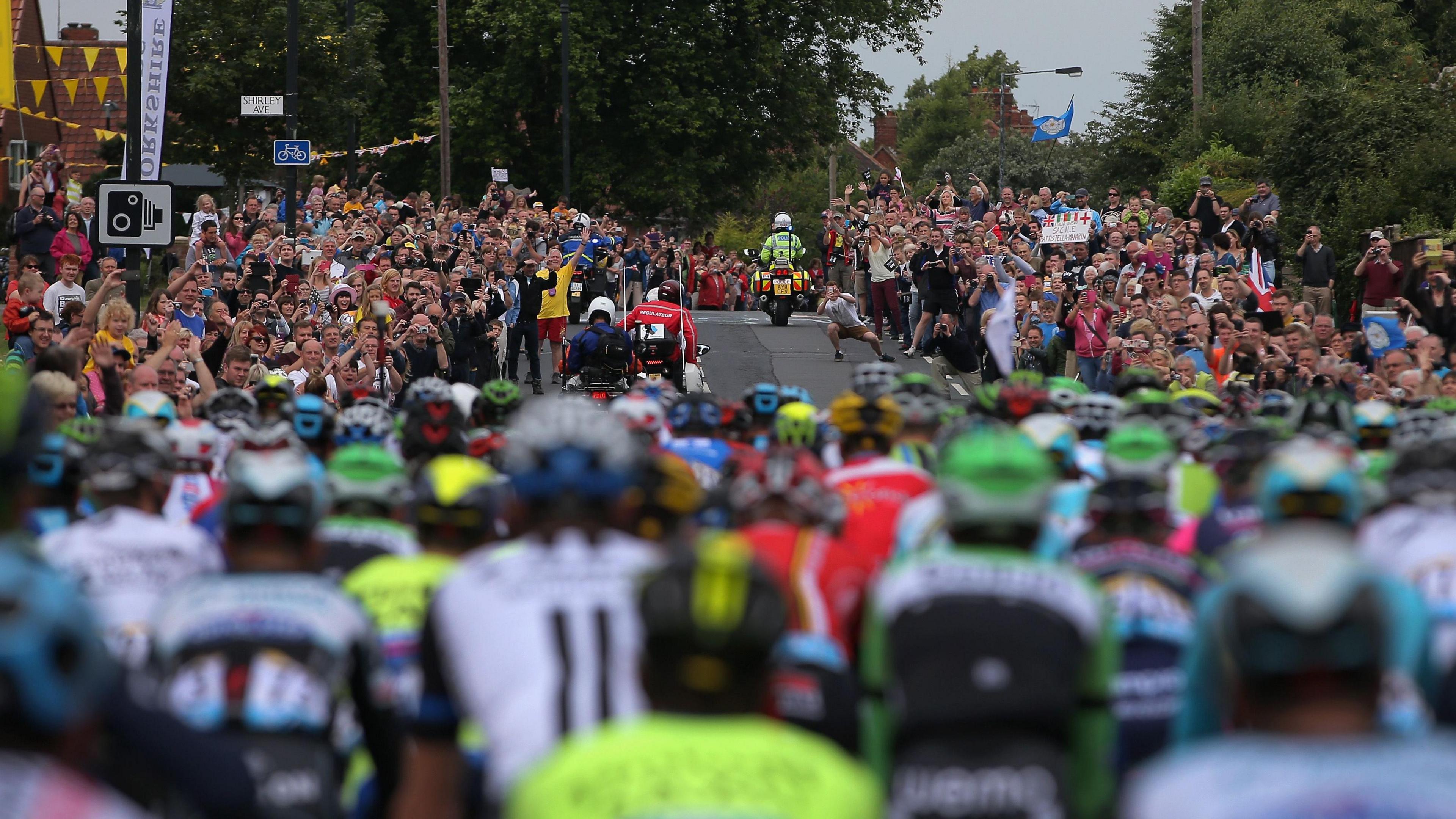
Mr Prudhomme said French cycling fans "had to be convinced" staging the race opening in Yorkshire was the right thing to do
So, could the Tour de France ever return to the county?
Mr Prudhomme offers a glimmer of hope, but hints that competition for hosting a stage is fiercer than ever.
"I hope so," he responds. "What’s difficult for Yorkshire is that it was the milestone.
"Thanks to Yorkshire, many other countries and cities from Spain to Germany to the Netherlands to France have said, 'we want that'."
Whether or not the world's biggest cycling race ever returns to this most picturesque and down-to-earth of regions, no-one is in any doubt that the first weekend of July 2014 will live long in the memory for everyone lucky enough to have witnessed it.
Additional reporting by Paul Ogden, BBC Yorkshire.
Follow BBC Yorkshire on Facebook, external, X (formerly known as Twitter), external and Instagram, external. Send your story ideas to yorkslincs.news@bbc.co.uk, external
Related stories
- Attribution
- Published6 July 2014
- Published26 May 2024
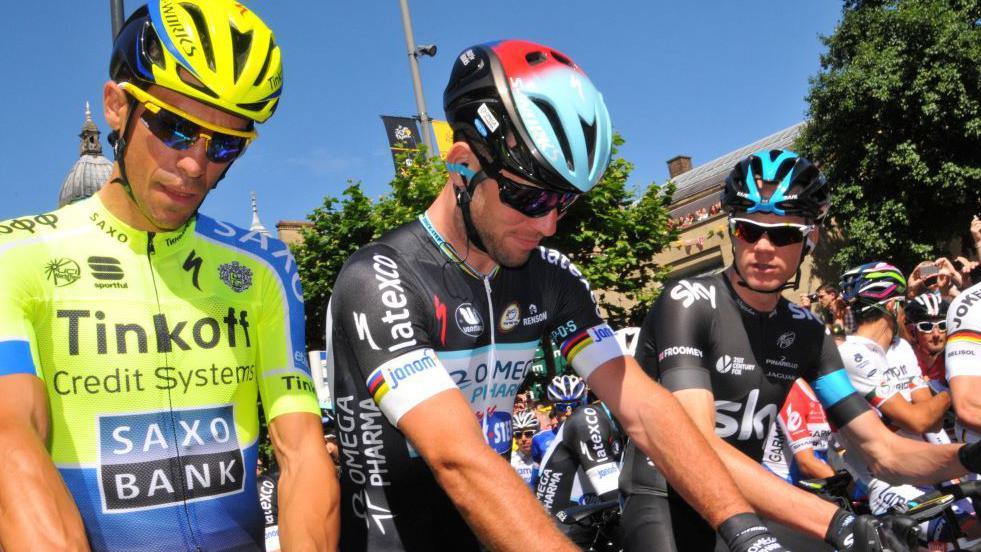
- Published28 July 2022
